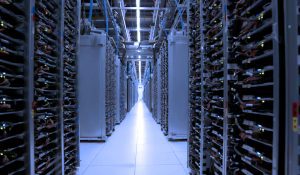If we look at colocation data center growth throughout the world, Asia is unequivocally leading in demand and speed to market. I recall a presentation at last year’s International Colocation Club by Omer Wilson, Senior Director of Marketing for APAC at Digital Realty, a prominent data center wholesaler. Wilson illustrated the tremendous growth in data centers happening today – and what it all means for colocation providers. “We saw 10% growth in the number of Internet users from January 2016 to January 2017, but that Asia was much higher – 31% in the same period.”
Wilson continued the narrative with these three influencers to the colocation data center market growth.
1. Internet Growth Driving Colo Data Center Demand
In 1905, Wilson said 80% of the agriculture production in the U.S. went to feeding horses. He showed a photograph of a busy New York street to illustrate his point; it was filled with pedestrians and horses transporting goods.
He then showed a photo from 10 years later and all the horses were gone, replaced by motor vehicles. Left unspoken was the clear impact on agriculture production – if you lose 80% of your market within a decade that has to be a dramatic effect.
Today, we’re witnessing another shift in transportation. Most notably in the advent of driverless cars, or unmanned cargo ships. “The key thing about where we are and where we’re going, is just the sheer speed,” Wilson noted.
2. Mobile Adoption Connects Everything Geographically
The speed at which we’re adopting mobile devices is likewise nothing short of astounding. More than 1 billion more people will be using mobile phones by 2020 as compared to 2015, Wilson said.
10 countries will account for 70% of that growth, predominantly in Asia. India and China will lead the charge – to the tune of 55% of global subscriber growth. Some 100 million to 150 million new subscribers will come online each year.
Being connected has become so important. In India, as an individual progresses from lower to middle class, “[before they] buy an air conditioner or a fridge even, they’ll have a mobile phone,” Wilson said. All those phones, naturally, mean more data traversing wireless networks – and eventually landing in a data center. “That’s why there’s going to be such massive cloud infrastructure and data transmitted in the future.”
3. Solving the Energy Dilemma with Colocation Data Centers
Energy consumption is an issue that any data center owner or operator has been concerned with. But as we start building data centers in places that don’t have reliable sources of electricity to begin with, it’s time to start getting creative.
“The question we’re toying with is: Can data centers themselves start producing energy and how would that work?” Wilson asked.
If all of these people are buying mobile devices, we’re going to need some kind of data center relatively close to where they are – because latency is the enemy of good performance. In reality, many will be micro or edge data centers but still, if that means building them in every village in Southeast Asia, we need to think about how to power them. Enter the concept of self-sufficient data centers and micro-grids. “There needs to be thought around [energy] storage and especially electrical battery technology,” Wilson said.
Revolutionary Growth for Colocation Data Centers
These prominent societal changes and infrastructure-based issues impacting the data center industry are problems Schneider Electric intends to overcome. As well as it an opportunity for colocation providers to recognize and find alternative, revolutionary ways to meet the ongoing demands of customers. The point is, revolutions bring dramatic change. It’s our job – and yours – to be ready for it. Watch the video from last year’s International Colocation Club and learn how the technology advancements will be an ongoing influencer to colocation data center change.



